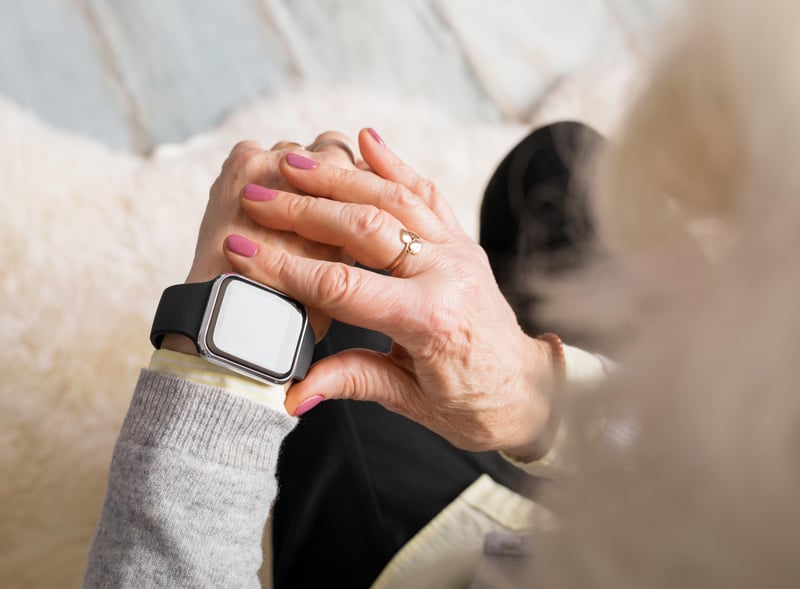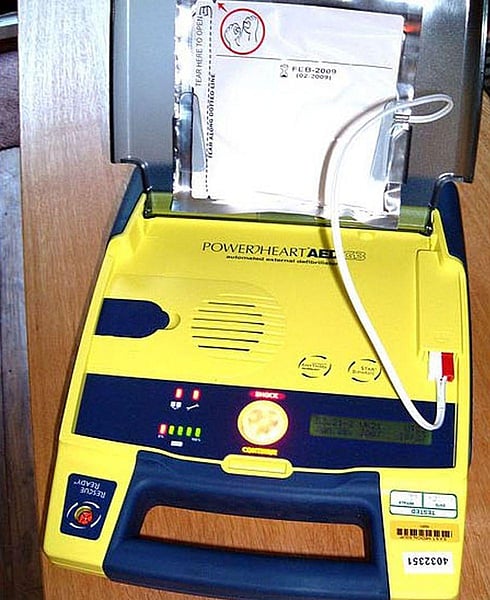Market Pharmacy is now G&G Pharmacy, conveniently located in Marketplace Foods on the corner of Hwy 2 & Broadway!
Same great staff and same great care!
Manténgase sano!
Resultados de su búsqueda "Defibrillators".
Resultados de noticias de salud - 11
Thousands of Americans with heart trouble have small implanted defibrillators, to help regulate their heartbeat and keep cardiac events at bay.
But new research finds that on extremely hot days, people with the devices face nearly triple the odds for a dangerous arrhythmia known as
Drones might prove a feasible way to deliver lifesaving defibrillators to cardiac arrests in remote areas, a new research simulation suggests.
Delivering automated external defibrillators (AEDs) by drone could dramatically improve emergency response times in both urban and rural areas, according to findings to be presented Saturday and Sunday at an American Heart Association meeting, in P...
- Dennis Thompson HealthDay Reporter
- |
- November 6, 2023
- |
- Página completa
New research finds that many of those who have received an implanted cardiac device to extend their life also have mood disorders, including anxiety, depression and PTSD.
"Implantable cardioverter defibrillators [ICDs] are effective at extending patients' lives, but we need to make sure that's a good quality life,"said study author
- Cara Murez HealthDay Reporter
- |
- June 19, 2023
- |
- Página completa
Cars are going electric at record speed, but are the high-powered charging devices the cars need safe for people who have implanted heart devices?
Yes, claims new research that also found home car chargers are likely also safe, as long as the person with the ...
- Cara Murez HealthDay Reporter
- |
- April 17, 2023
- |
- Página completa
If you're one of the millions of people with a pacemaker or an implantable defibrillator to help control abnormal heart rhythms, certain health-tracking devices may do more harm than good.
Smartwatches, rings or scales that emit electrical currents can interfere with these lifesaving implantable heart devices, causing them to malfunction, a new study suggests.
"While the electr...
- Denise Mann HealthDay Reporter
- |
- February 22, 2023
- |
- Página completa
When implanted heart devices get infected, doctors recommend surgery to remove them, but many patients ignore that advice, a new study reveals.
More than eight in 10 patients with an infected implant (such as a defibrillator or pacemaker) choose antibiotic treatment instead, t...
- By Cara Murez HealthDay Reporter
- |
- April 8, 2022
- |
- Página completa
It's a familiar trope of TV and movies -- a couple is engaged in passionate sex when the guy's heart suddenly gives out.
"Usually it's a middle-aged man. Usually he's cheating with somebody else. It's funny, there's this myth in our mind that this can happen," said cardiologist Dr. Martha Gulati, who refers to the concept as the "Hollywood heart attack."
But ardor simply isn't that ...
- Dennis Thompson HealthDay Reporter
- |
- January 13, 2022
- |
- Página completa
People who are prescribed opioid painkillers after receiving a heart pacemaker or defibrillator may be at risk for opioid abuse -- and the higher the initial dose, the greater the risk, according to a new study.
"The significance of this study is to make other electrophysiologists aware that even a low-risk procedure like a pacemaker or a defibrillator can lead to chronic opioid use and t...
- Robert Preidt
- |
- December 1, 2021
- |
- Página completa
Adult staff in schools are more likely than students to suffer sudden cardiac arrest, but automated external defibrillators (AEDs) are often used and improve the chances of survival, a new study finds.
AEDs are portable devices that deliver an electric shock to try and restart the heart. If appropriate action isn't taken immediately, cardiac arrest is often fatal.
"Most research on ...
- Robert Preidt
- |
- October 15, 2021
- |
- Página completa
If you have a cardiac arrest, your odds of survival are best in an airport or airplane, a new study finds.
That's because automated external defibrillators (AEDs) are readily available and so are people ready to help, researchers explained.
"Our findings emphasize that cardiac arrest in travelers is survivable and that early resuscitation interventions matter," said lead researcher ...
- Steven Reinberg
- |
- September 20, 2021
- |
- Página completa
Do you have an implanted defibrillator or pacemaker? Try keeping your smart watch or smart phone a few inches away from them.
New research from the U.S. Food and Drug Administration finds that your phone or watch could interfere with implanted heart devices.
Based on the new findings, heart patients and health care providers should be aware of potential risks, the research team...
- Ernie Mundell and Robert Preidt HealthDay Reporters
- |
- August 26, 2021
- |
- Página completa

















